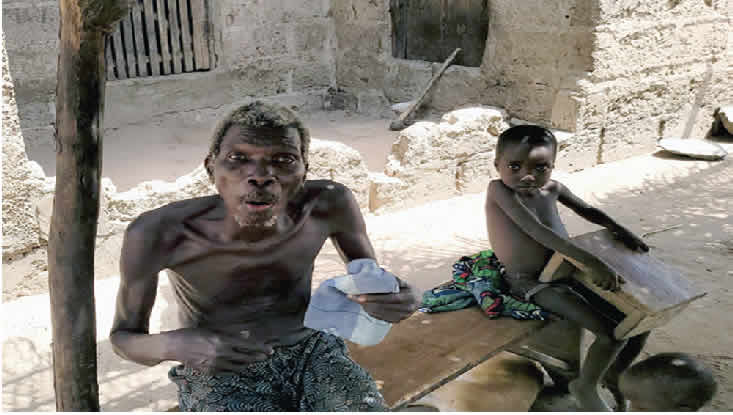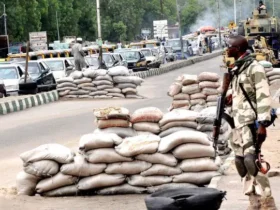In the Yewa North Local Government Area of Ogun State, accessing safe drinking water is a dire challenge for residents of Asaa, Agbelepon, Agbele, Oke-Odo Ibore, and Lafenwa.
In these agrarian communities, daily life is overshadowed by hardship and suffering due to the scarcity of clean water, a fundamental requirement for human survival.
Lacking access to boreholes or dependable wells, the inhabitants are left with no choice but to draw water from polluted streams and rivers or undertake lengthy trips into Benin Republic to procure clean water.
An investigative report by PUNCH Healthwise has exposed the grim consequences of this water crisis, including numerous deaths and widespread health issues among the residents of Asaa, Agbelepon, Agbele, Oke-Odo Ibore, and Lafenwa.
For years, residents of these communities have endured a myriad of health issues, including gastrointestinal diseases and skin infections, among other debilitating illnesses.
Many have resorted to seeking solace in religion, turning to prayer in hopes of a miraculous intervention that will provide them with water. Yet, despite their fervent prayers, their lives remain entrenched in hardship and uncertainty.
The quest for clean water often leads residents to neighboring Benin Republic, but at a high cost—exposing them to the dangers of criminal elements.
PUNCH reports that a source, David Adenusi recounted the tragic loss of his son, Solomon, who fell victim to suspected herdsmen during one of these perilous journeys.
Asaa, already plagued by several reported cases of herdsmen attacks between 2020 and 2022, witnessed the heartbreaking incident in June 2021.
Solomon and his friends set out to fetch water from a borehole in Owode, a nearby village in Benin Republic, only to be ambushed by armed men believed to be herders. While his friends managed to escape, Solomon was brutally killed.
David Adenusi’s grief remains palpable, even after more than two years since his son’s tragic demise. Amidst his sorrow, he fondly remembers Solomon’s vibrant spirit, his infectious laughter, and his unwavering eagerness to learn and help around the house.
He said, “I still see his face every time I close my eyes. It’s difficult to articulate the pain of losing a child. I miss him every day. I know I will never see him again, but releasing the pain is challenging. What makes the pain run deep is the fact that we still lack access to clean water.
“We’re forced to drink from contaminated sources, and I understand it’s unsafe. But what other option do we have? I hold onto the hope that one day, things will change; that we’ll have clean water and won’t need to risk our lives just to quench our thirst.”
Adenusi revealed that after the tragic loss of his son, neither he nor his family could muster the courage to venture into Benin Republic for clean water anymore.
Expressing his sorrow in Yoruba, he stated, “We understood the dangers involved were too great, and we couldn’t fathom the idea of another loss. Thus, we turned to using the contaminated water from the community streams.”
“We know it is unsafe as it often causes diarrhoea and stomach cramps but there are no alternatives. We are trapped here with no foreseeable end in sight.”
Adenusi’s account highlights the enduring struggles faced by Asaa and its neighboring communities due to the scarcity of water. This tragic event underscores the myriad dangers residents confront and the extreme measures they resort to in order to survive.
After conversing with over 30 residents, including community leaders, it became evident that many suffer from illnesses caused by consuming contaminated water, their only available source.
Findings also revealed that children often miss school as they spend significant time fetching water, while pregnant women sometimes give birth during their search for water.
Despite assurances from the Ogun State government regarding the provision of clean water, residents of Asaa and nearby communities claim they have yet to receive even a basic hand-dug well.
They lament being trapped in a cycle of poverty and poor health, deprived of access to clean water and other essential amenities. Despite their appeals to the state government for assistance, they feel abandoned and forgotten, left to fend for themselves amidst the harsh economic realities.
Some residents express their frustration, stating that the only means of obtaining clean water is by trekking for over two hours to Owode or Egelu in Benin Republic.
Furthermore, they occasionally journey to Agbon and Ibeku, situated within Nigeria’s borders, to fetch water from wells.
Mary Ogundele, a resident of Oke-Odo Ibore, shared her experience of walking long distances to fetch water for her family. She lamented the toll it takes on her body and the frequent illnesses her children suffer due to the contaminated water they obtain.
“My children always fall sick because of the water here. I have no choice but to use this water,” she said.
Binace Ogundele, another resident, expressed comparable sentiments, saying, “Our circumstances are grave. We’re left with no choice but to either utilize this water or undertake lengthy trips in search of clean water.”
“It’s impractical for us to journey to Benin Republic, which is why we sometimes rely on this water,” Ogundele added.
“As women, we often trek for two to three hours just to obtain water. Sometimes, we have to journey to Egelu, Owode, and other locations to access clean water from boreholes constructed by the Benin Republic government.”
Using the open-source tool Google Earth, it was discovered that the distance between Asaa and Owode in Benin Republic is roughly five kilometers. For residents of Agbele, Oke-Odo Ibore, and Lafenwa, the distance exceeds seven kilometers.
Research conducted by PUNCH Healthwise reveals a significant disparity between the funds allocated to water supply in Ogun State and the actual access to clean water. Despite substantial allocations, the state continues to struggle with water accessibility.
According to the 2021 Water, Sanitation, and Hygiene National Outcome Routine Mapping, 38 percent of Ogun State residents consume water contaminated with E. coli, either from its source or within their households. Moreover, only 34 percent of the population in Ogun State have access to safely managed water.
Additionally, a study by the Department of Civil Engineering at Covenant University, Ota, Ogun State, found that 81 percent of residents rely on groundwater resources, with only 14.9 percent receiving water from public utilities.
Further investigation into the state’s budgetary allocations for water supply from 2020 to 2023 revealed a substantial amount allocated for rural water supply. However, the implementation of these projects showed less than a 20 percent performance rate over the four-year period.
Despite Governor Dapo Abiodun’s declaration of a state of emergency in water, sanitation, and hygiene, no boreholes claimed to have been constructed by the government were sighted in Asaa or neighboring communities.
Residents reported resorting to digging ditches to access unclean water during dry seasons, which becomes contaminated streams during rainy seasons. These ditches, about five feet deep, are filled with greenish water and debris, serving multiple purposes including drinking, cooking, and bathing.
Furthermore, inhabitants of Agbele, Oke-Odo Ibore, and Lafenwa trek for up to an hour to Asaa to access this contaminated water.
The traditional ruler of Asaa, Adele Baale Matthew Olukoku, highlighted the dire consequences of using this water, which often leads to waterborne illnesses and skin infections.
“The water emits a foul odour and has an unpleasant taste, yet we are left with no alternative. It’s like consuming poison, but we are compelled to drink it.
“We are left with no recourse! These ditches have transformed into a symbol of our fight for survival, serving as a constant reminder of the hurdles we endure just to obtain the most fundamental necessities,” lamented the community leader.
According to investigations, residents of Asaa and the four adjacent communities have endured considerable hardships, with numerous individuals falling victim to illnesses suspected to originate from contaminated water sourced from the ditches.
Joseph Oga, the community leader of Agbelepon, revealed that it took numerous fatalities before they could establish a connection between the deaths and the water from the ditches.

Despite being aware of the grave risks associated with consuming the polluted water, residents find themselves trapped between two perilous choices – either risk their lives by drinking the hazardous water or embark on the dangerous journey to Benin Republic in search of clean water.
“It’s not a simple task and travelling to Benin Republic is like a whole day’s work for our women. Consequently, we often resort to drinking the water as is and pray for a miracle.
“It feels as though a curse has been placed upon us. We’re at a loss for what to do. We simply yearn for access to clean water so that we can live in peace.
“The absence of clean water has had a devastating impact on the people of Asaa, and its effects continue to linger,” lamented the visibly distressed community leader.
Also expressing his disappointment, the youth leader of Asaa, Adebisi Oludokun, said, “Mysterious deaths are common here, particularly among the youth and children.
“There was a time we had a cholera outbreak and a lot of people were killed in this area, but it looks like the government doesn’t care about what we are going through.”









Leave a Reply